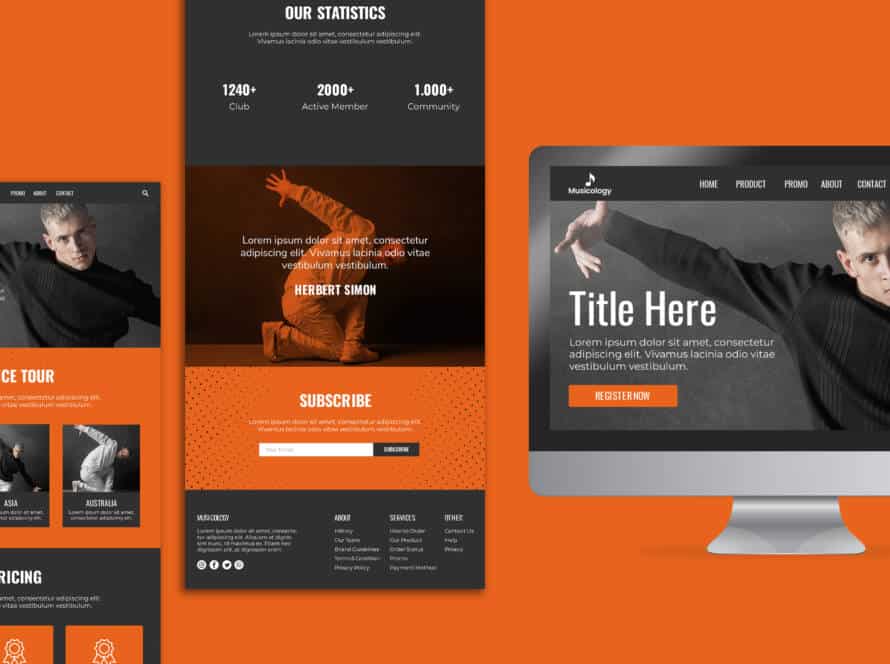Platforms like WordPress, Shopify, Wix, and others all rank among the best CMS platforms, but the right choice is the one that supports your growth.
That said, WordPress is by far the most widely used CMS, powering more than 40% of all websites. People love it because it’s flexible, easy to customize with plugins, and works well with just about any tool you’d want to connect to your site.
Which CMS is the right match for you?
WordPress
Most WordPress themes are built with a clean code structure, and frequent updates keep them compatible with search engine requirements. This makes it easier for your site to be crawled, indexed, and ranked.
The real power comes from its integration with SEO plugins like Yoast SEO and Rank Math. These tools let you optimize meta titles, descriptions, XML sitemaps, and schema markup.
Beyond SEO, WordPress stands out for its unmatched flexibility. With thousands of themes and plugins available, you can customize your site to fit any business.
For many entrepreneurs, WordPress is the best CMS for small business owners who want both simplicity and growth potential.
This means your website isn’t just built for looks. It’s designed for visibility, steady growth, and long-term success.
Wix
Wix is popular with beginners because it’s simple to use. The drag-and-drop builder doesn’t require any coding knowledge, so creating a website feels quick and straightforward.
That said, Wix gives you less control than more advanced content management systems like WordPress. It limits certain technical adjustments, such as server settings or detailed schema customization, which experienced marketers often look for.
For small websites or personal brands, Wix is a solid choice. But if you’re aiming for long-term growth and need more advanced features, WordPress or Shopify will serve you better.
Squarespace
Squarespace is a user-friendly CMS, known for its sleek, professional templates. Many creatives, such as photographers and designers, choose it for visually polished websites without technical hassle.
Its SEO tools have improved, now offering SSL, mobile optimization, and customizable meta tags. This makes Squarespace capable of supporting strong search performance for small to medium projects.
However, customization is limited compared to WordPress. You can’t extend functionality with thousands of plugins.
If your priority is simplicity and design appeal, Squarespace works well. But for scalable SEO growth and maximum flexibility, WordPress remains the stronger long-term option.
Shopify
Shopify is built for e-commerce. It handles the difficult parts of running an online store, such as inventory, payments, shipping, and product management, so you can focus on your business.
It’s straightforward for beginners and powerful enough for growing stores, with a wide range of apps to add extra features.
The main limitation is that Shopify is less flexible for non-commerce content. If your site is all about products, Shopify is hard to beat. If you need more of a balance between content and selling, WordPress gives you broader options as one of the best CMS for small business choices.
Joomla
Joomla sits in the middle ground between simple platforms like Wix and website builders like Drupal. Still, it holds its own as one of the best CMS platforms for users who need more technical control.
It’s a good choice for users with some technical experience who want more control over their content and site structure.
Joomla offers more built-in features than Wix and gives you greater freedom to customize compared to Squarespace. However, it’s not as easy to learn as WordPress, so beginners might find it harder to use at first.
Drupal
Drupal is one of the most powerful and secure CMS platforms on the market. It’s widely adopted by governments, universities, and enterprise-level companies that need complex sites with strong data protection.
That said, without a dedicated developer, most small businesses will find it difficult to set up, manage, or update compared to beginner-friendly platforms.
For businesses seeking ease of use and quick growth, WordPress remains the more practical option.
Magento
Magento is a heavyweight e-commerce CMS built for enterprise-level stores. It gives complete control over product management, customer experience, and integrations. With Magento, brands can scale without worrying about technical limitations.
However, its power comes with complexity. Managing Magento requires developers, hosting resources, and ongoing maintenance. For small and medium-sized businesses, this can feel overwhelming and expensive.
If you run a large-scale e-commerce operation with a technical team, Magento offers unmatched flexibility.
That said, WordPress with WooCommerce or Shopify is the more practical choice for most other businesses.
Ghost
Ghost is a modern publishing platform designed specifically for writers and bloggers. It’s lightweight, fast, and optimized for SEO right out of the box. Many independent publishers appreciate its distraction-free experience.
Unlike WordPress, however, Ghost doesn’t have a large plugin ecosystem. Customization options are limited, and integrating extra features often requires coding knowledge or third-party tools.
For creators who just want a clean space to write and publish content, Ghost is excellent. But if you want to grow into e-commerce, membership sites, or advanced marketing, WordPress offers much greater versatility.
HubSpot CMS
HubSpot comes with SEO features, personalization options, and security baked in. Yet, its biggest downside is cost. Subscription fees are significantly higher compared to WordPress, especially for startups with limited budgets.
HubSpot Content Management System is great for companies that want an all-in-one tool for marketing and content, and have the budget for it. But for most small businesses, WordPress gives you many of the same features at a much lower cost.
The team at Bave Designs can help you decide on the best CMS for small business success and set up a site built for performance, SEO, and long-term results.Ready to take the next step? Reach out to Bave Designs and let’s build a website that works as hard as you do.




